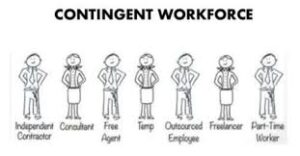Contingent vs Contract Worker

The question is no longer whether hiring contingent workers will be valuable, but rather which type of contingent workers should be hired for your company’s needs and situation. By engaging these workers, organizations are able to be agile and save costs while mitigating risks. The contingent workers act as a variable workforce for companies to perform specific projects or complete specialized projects.
To fully harness the power of the contingent workforce you must first understand the different types of these nontraditional workers. Like temps, contractors, freelancers, and consultants, that work alongside your company’s internal employees. By design, contingent workers are not on your company’s internal payroll and not employees.
Hired On-Demand
Unlike your internal full-time or part-time employees, you hire contingent workers on-demand and often for a limited duration or project. There’s no commitment to retain the contingent hires beyond the scope of the project or contract.
Not Eligible for Benefits
Since they’re not internal employees, contingent workers don’t qualify for company benefits or other perks like retirement plans and stock options. However, that doesn’t mean that contingent workers go without these benefits entirely. In some cases, such as when workers are hired through third-party staffing vendors, the staffing company takes care of benefits and perks for contingent workers.
Types of Contingent Workers
There are three main types of contingent workers:
- Temporary – Employed by a staffing agency, typically work at the client company’s worksite on their temporary work assignments. These assignments may last anywhere from a few hours to a few months. Temporary workers can fill gaps quickly for the client company on an as-needed basis.
- Consultants – Experts in their fields, advising businesses within their area of expertise. Often work in highly specialized, complex, and/or technical fields. Like all contingent workers, consultants are non-employees who aren’t on your payroll. They typically work with a high level of independence. Companies most often hire consultants either through consulting firms or as independent contractors.
- Independent contractors (1099) – Includes freelancers, consultants, and gig workers. They are self-employed, offering services independently and they hold responsibility for all employment-related taxes and are not eligible for company-provided benefits. Other than defining deliverables and deadlines, companies cannot control when or how an independent contractor gets their work done or they risk noncompliance.
Understanding the nuances of worker classification can help your company build the right mix of talent.
The Cardinal Culture – Finding Jobs for 28 Years
We understand there will always be daily challenges. That’s why Cardinal Staffing Services remains flexible to the needs of our valued clients and candidates. We take the time for fully know and understand the needs of our candidates and clients. And that’s why we remain the Best-In-Class staffing partner since 1994. Let us be your staffing partner. Contact us Today!